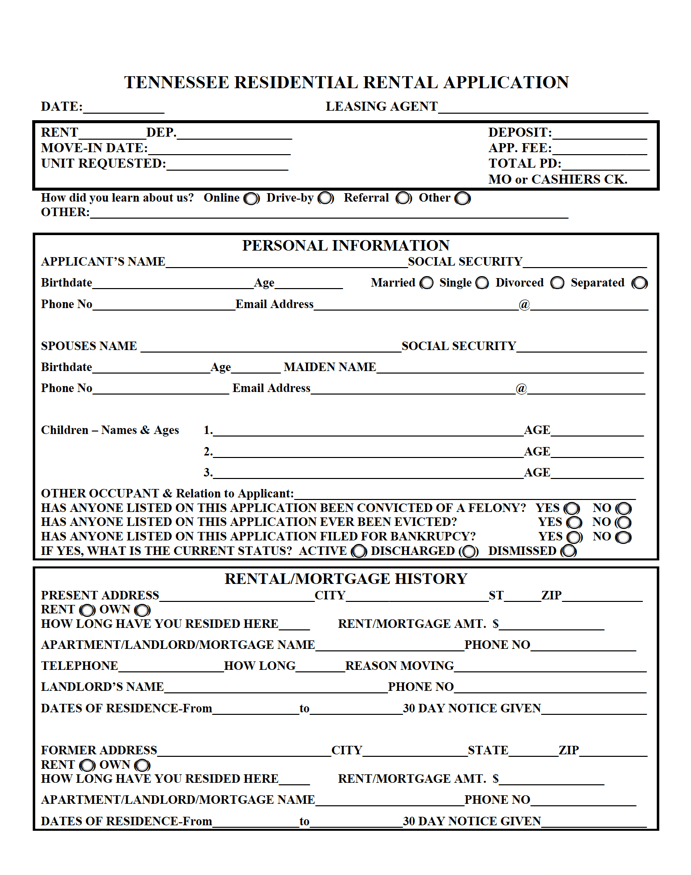The Tennessee rental application form is a crucial document for both landlords and prospective tenants in the state of Tennessee. It serves as a tool to assess the eligibility of potential tenants before they are granted permission to rent a property. Understanding the intricacies of this form can help ensure a smooth rental process for both parties involved.
In this article, we will delve into the essential elements of the Tennessee rental application form, providing insights into what information is required, the significance of each section, and tips for both landlords and tenants to effectively navigate the application process. With a focus on expertise, authoritativeness, and trustworthiness, we aim to equip you with all the necessary knowledge to make informed decisions in your rental journey.
Whether you are a landlord seeking reliable tenants or a prospective renter looking for your next home, this guide will clarify the importance of the rental application form and how to utilize it effectively. Let's explore the details!
Table of Contents
- Introduction
- What is a Rental Application Form?
- Importance of the Rental Application Form
- Key Elements of Tennessee Rental Application Form
- Tenant Information
- Landlord Information
- Background Checks
- Tips for Tenants
- Tips for Landlords
- Conclusion
What is a Rental Application Form?
The rental application form is a standardized document that landlords use to collect information from prospective tenants. This form typically includes personal details, rental history, employment information, and references. By reviewing the completed application, landlords can make informed decisions regarding tenant selection, ultimately protecting their investment and ensuring a positive rental experience.
Importance of the Rental Application Form
The rental application form serves several vital purposes, including:
- Screening Tenants: Landlords use the form to screen potential tenants based on their financial stability, rental history, and background.
- Legal Protection: A well-documented application can provide legal protection for landlords in case of disputes.
- Establishing Expectations: The form helps establish clear expectations regarding the rental agreement and responsibilities.
Key Elements of Tennessee Rental Application Form
The Tennessee rental application form consists of several key sections that need to be filled out accurately. Understanding these elements is crucial for both landlords and tenants.
1. Personal Information
This section requires the applicant to provide their full name, contact information, and date of birth. Landlords often use this information to verify the tenant's identity.
2. Rental History
Applicants must include information about their previous rental experiences, including addresses, landlord contacts, and the duration of tenancy. This information helps landlords assess the applicant's reliability as a tenant.
3. Employment Information
Details regarding the applicant's current employment status, including employer name, salary, and duration of employment, are essential to gauge their financial stability.
4. References
Providing personal or professional references can enhance the tenant's application. Landlords may contact these references to obtain insights into the applicant's character and reliability.
Tenant Information
When filling out the Tennessee rental application form, tenants should ensure that all information is accurate and up to date. Commonly requested tenant information includes:
- Full name
- Social Security number
- Phone number and email address
- Current address and previous addresses
- Employment details
- Income verification documents
Landlord Information
Landlords are also required to provide specific information on the rental application form. This information typically includes:
- Full name and contact information
- Property address
- Rental terms and conditions
- Application fee details (if applicable)
Background Checks
Conducting background checks is a standard practice for landlords during the application process. This may include checking the applicant's credit history, criminal background, and rental history. It is important for landlords to obtain written consent from the tenant before conducting any background checks.
Tips for Tenants
To enhance your chances of securing a rental property, consider the following tips:
- Complete the application thoroughly and accurately.
- Gather necessary documents, such as pay stubs and references, ahead of time.
- Be honest about your rental history and financial situation.
- Follow up with the landlord after submitting your application.
Tips for Landlords
Landlords can also benefit from following best practices during the application process:
- Clearly communicate application requirements and fees.
- Review applications promptly to avoid losing potential tenants.
- Maintain transparency regarding the screening process.
- Ensure compliance with fair housing laws.
Conclusion
In conclusion, the Tennessee rental application form is a vital tool for both landlords and tenants. By understanding the key elements of the form and following best practices, both parties can navigate the rental process more effectively. If you found this article helpful, we encourage you to leave a comment, share it with others, or explore additional resources on our site for more information.
Thank you for reading, and we look forward to seeing you again soon!
Unlocking The Mystery Of Auger Crossword Clue: A Comprehensive Guide
Understanding Fillmore Gazette Obituaries: A Comprehensive Guide
Understanding R Asktrans: A Comprehensive Guide


